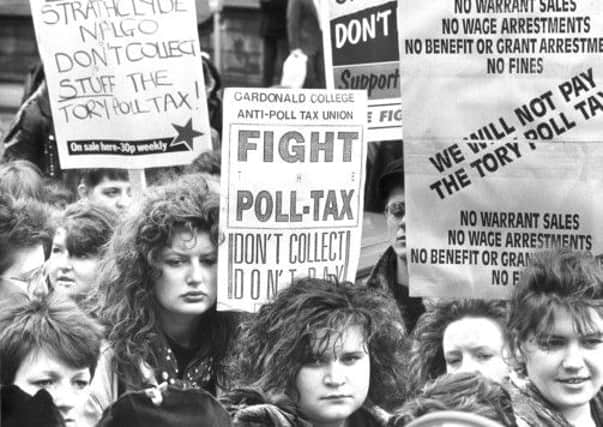Oliver Letwin pushed for poll tax go-ahead


Papers released by the National Archives in Kew, west London, show that Mr Letwin - an adviser in the No 10 policy unit in the 1980s - helped to convince Mrs Thatcher to use Scotland as a “trailblazer” for the new tax in the teeth of the opposition of senior colleagues.
CONNECT WITH THE SCOTSMAN
• Subscribe to our daily newsletter (requires registration) and get the latest news, sport and business headlines delivered to your inbox every morning
Advertisement
Hide AdAdvertisement
Hide AdThe introduction of the community charge, as it was officially known, in Scotland in 1989 and the following year in England and Wales, was a disaster for the Tories, provoking riots and protests across the country and helping to precipitate Mrs Thatcher’s final downfall.
The seeds of the debacle were sown four years earlier in 1985, when she was persuaded by environment ministers Kenneth Baker and William Waldegrave that she could realise her long-held ambition to abolish the old domestic rates - based on property values - through a new, flat-rate tax payable by all adults.
Following a presentation by the two ministers at Chequers, Lord (Victor) Rothschild - who had advised on the scheme - wrote to the prime minister enthusiastically to proclaim the proposed reform of local government finance “a winner”.
But within Whitehall, doubts quickly surfaced as officials began to work through the implications of the changes.
In April 1985, Mr Letwin warned that a study by the Department of the Environment had identified “a number of unpleasant effects”, with some 7.5 million households - 44% of the total - set to lose out.
Parts of London, including some “politically sensitive” areas, would be “very badly hit”, with the amount of tax they would have to pay almost doubling, while low-spending shire districts and northern industrial areas would face large rises.
• http://www.scotsman.com/news/uk/tories-used-scotland-as-poll-tax-guinea-pig-1-3646489|Tories used Scotland as ‘poll tax guinea pig’|link to article}
In the Cabinet, chancellor Nigel Lawson led the opposition, with a stinging memorandum warning the whole scheme would be “completely unworkable and politically catastrophic”.
Advertisement
Hide AdAdvertisement
Hide Ad“The biggest gainers will be the better-off households in high rateable value properties, the losers would be poorer households, particularly larger ones,” he wrote.
“We should be forced to give so many exceptions and concessions (inevitably to the benefit of high-spending authorities in inner London) that the flat-rate poll tax would rapidly become a surrogate income tax.”
Home secretary Douglas Hurd suggested the new tax could prove as hard to collect as the television licence in parts of Northern Ireland - still then in the grip of the Troubles.
“Experience in other contexts - for instance, of trying to operate the TV licensing system in West Belfast - illustrate the problems which revenue-collecting operations can encounter in difficult areas,” he warned.
“Without a really effective machinery, one can expect to find evasion and fiddling among all classes of people.”
Even Mr Baker, the scheme’s architect, was beginning to have doubts, proposing a watered-down alternative combining the flat-tax levy with elements of a property charge.
But Mr Letwin - now a Cabinet Office minister and David Cameron’s policy supremo - urged Mrs Thatcher to stick to the original plan.
He said Scottish secretary George Younger was “extremely keen” to pioneer the scheme ahead of its introduction in England and Wales after experiencing a furious backlash following a revaluation of the rates in Scotland.
Advertisement
Hide AdAdvertisement
Hide AdUsing Scotland as a “trailblazer” for the “pure” poll tax would be preferable to Mr Baker’s “mixed” tax, he suggested.
“No one can say that you are being insufficiently radical, since you will be ... trying out an extremely radical system in a significant part of the country. By the same token, no one can accuse you of being rash, since you will be reserving your options on domestic rates in England and Wales,” he advised.
“If you are not willing to move to a pure residence charge in England and Wales immediately, you should not introduce a mixture of taxes, but should rather use the Scots as a trailblazer for the real thing.
SCOTSMAN TABLET AND IPHONE APPS